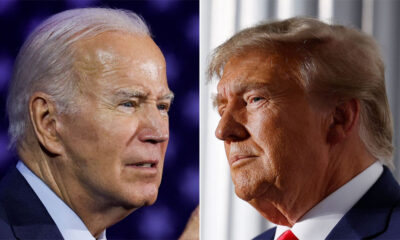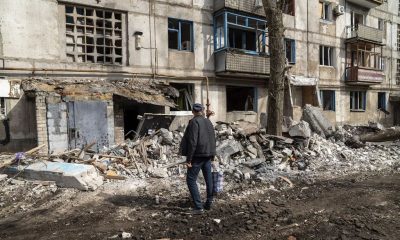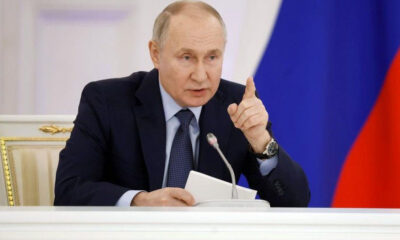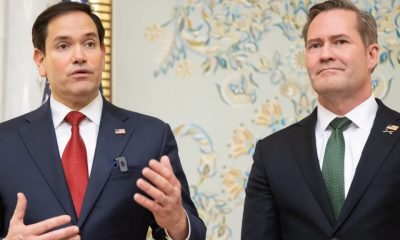International
Biden gets praise, criticism for calling Russia’s actions in Ukraine ‘genocide’
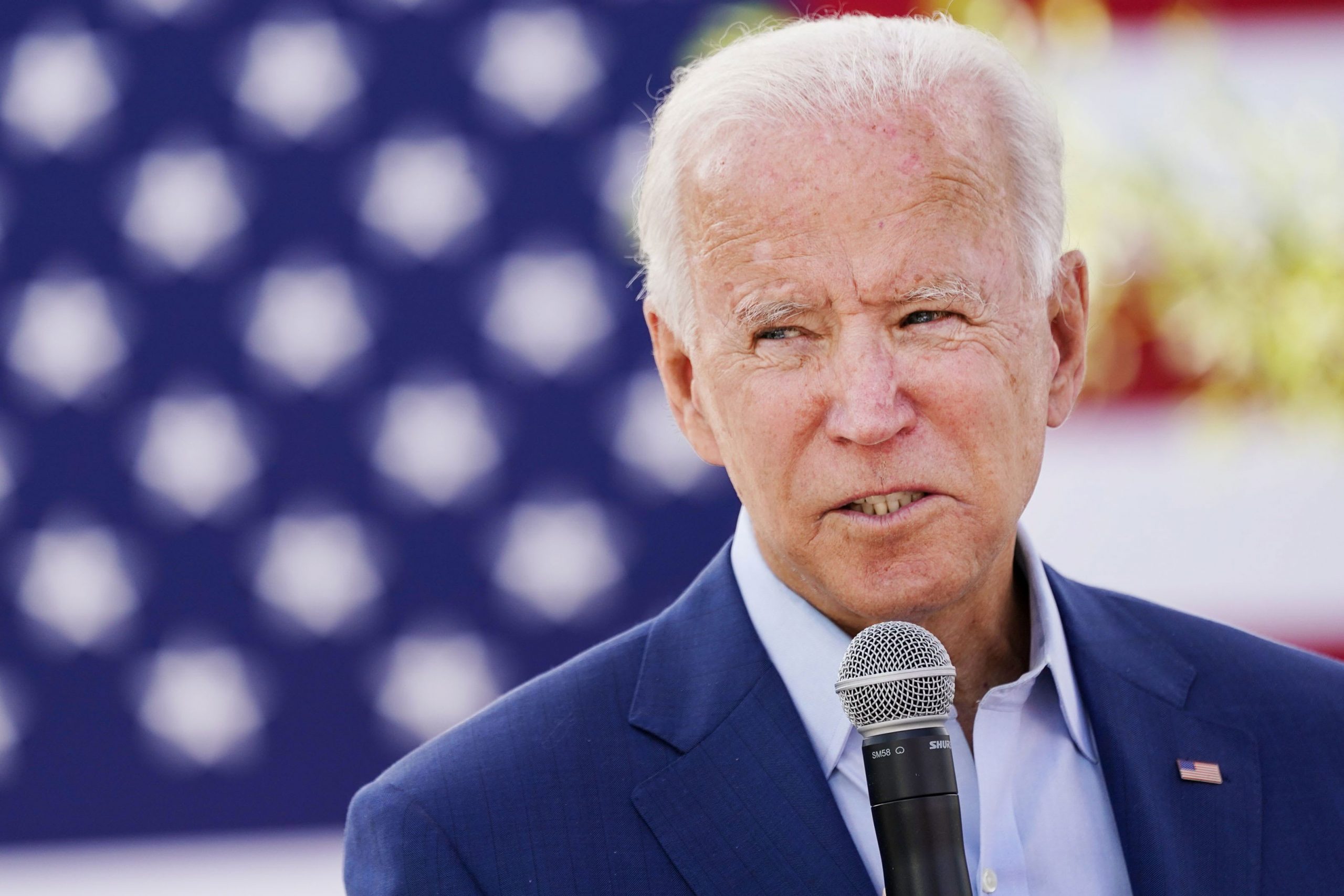
President Joe Biden is getting both praise and criticism after doubling down on describing Russian President Vladimir Putin’s actions in Ukraine as “genocide” — the first time he’s used the term since the invasion began nearly 50 days ago — even as Ukraine’s President Volodymyr Zelenskyy for weeks has claimed that is what’s happening on the ground.
White House press secretary Jen Psaki defended his use of the term, as she did when Biden called Putin a “war criminal” and when he said “cannot remain in power,” saying Wednesday the president was simply expressing “what he feels.”
“The president was speaking to what we all see, and what he feels as clear as day in terms of the atrocities happening on the ground, as he also noted yesterday,” Psaki said, before tempering his use of the term. “Of course, there will be a legal process that plays out in the courtroom but he was speaking to what he has seen on the ground, what we have all seen in terms of the atrocities on the ground.”
Pressed directly on whether Biden’s comments might conflict with the U.S. policy, Psaki dismissed concerns and repeated the requirement of a “legal process” which can sometimes take years.
“He was not getting ahead of that. He was speaking on what he feels he sees on the ground,” she said.
“I do not think anybody is confused about the atrocities we are seeing on the ground — and different leaders around the world describe it in different ways,” Psaki added later on. “It is unquestionable that what we are seeing is horrific, the targeting of civilians, hospitals, children. The president was calling it like he sees it, and that is what he does.”
READ ALSO:
- Oyo court remands man for beating thief to death
- Lagos motorcyclist bags life sentence for raping passenger
- How Bride-To-Be, 28 Others Die In Sokoto Boat Mishap
State Department spokesperson Ned Price gave a similar line at his briefing Wednesday, saying Biden used the term based on “impressions that he has seen and that we all have seen,” but noted the U.S. is working with international lawyers to determine if Russia’s crimes meet the legal threshold.
During prepared remarks in Iowa Tuesday blaming inflation and gas prices on “Putin’s price hike,” Biden said, for the first time, “Your family budget, your ability to fill up your tank, none of it should on hinge on whether a dictator declares war and commits genocide half a world away.”
His use of the word raised questions among Washington reporters about whether it was an ad-libbed moment or a policy shift from the White House — until Biden later insisted he meant exactly what said.
“Yes, I called it genocide,” Biden told reporters after his remarks. “Because it has become clearer and clearer that Putin is just trying to wipe out the idea of even being able to be a Ukrainian. And the evidence is mounting. It’s different than it was last week, the more evidence is coming out of the — literally, the horrible things that the Russians have done in Ukraine and we’re going to only learn more and more about the devastation.”
Genocide is defined as an act “committed with intent to destroy, in whole or in part, a national, ethnical, racial or religious group,” according to the United Nations’ Convention on the Prevention and Punishment of the Crime of Genocide. Biden went on to acknowledge the U.S. government has an internal, legal process for designating whether genocide has occurred but still stood by what he indicated was his opinion.
“We’ll let the lawyers decide internationally whether or not it qualifies, but it sure seems that way to me,” Biden added.
Zelenskyy has argued — and pleaded — for weeks that Russia has met this definition and called on Western leaders to use the same term, so was quick to applaud Biden’s comments as “true words of a true leader.”
The Kremlin, meanwhile, blasted the comment as Putin indicated this week indicated his invasion won’t stop until his goals are met and said peace talks with Kyiv had reached a “dead end.”
“We consider this kind of effort to distort the situation unacceptable,” Kremlin spokesperson Dmitry Peskov told reporters Wednesday. “This is hardly acceptable from a president of the United States, a country that has committed well-known crimes in recent times.”
It’s not clear how many Western leaders will go as far as Biden and Zelenskyy — or what will take for them to reach the same conclusion.
READ ALSO:
- Six Kidnappers killed by police In Edo Gun Duel
- Mother of two allegedly poisoned by mother-in-law in Ilorin
- Max Air passengers violently protest flight delay in Abuja
No other Western nations have made the determination, aside from Estonian Prime Minister Kaja Kallas tying Russia’s crimes to the term in a tweet. French President Emmanuel Macron suggested Wednesday he’s more “careful” with his words than the American president, saying only that “war crimes” have been confirmed.
“So far, it has been established that war crimes were committed by the Russian army and that it is now necessary to find those responsible and bring them to justice,” Macron told France 2 in an interview.
“I am very careful with some terms [genocide] these days,” he added. “I’m not sure the escalation of words is helping the cause right now.”
Asked directly by ABC News Senior White House Correspondent Mary Bruce about Macron’s criticism Wednesday, Psaki declined to comment.
Macron also rebuked Biden’s language last month, when asked about Biden calling Putin a “butcher” and saying he “cannot remain in power” during remarks in Warsaw.
“I wouldn’t use those terms, because I continue to speak to President Putin,” Macron said in another interview with France 3. “Because what do we want to do collectively? We want to stop the war that Russia launched in Ukraine, without waging war and without escalation.”
Biden stood by his words then, saying he was “expressing moral outrage” but also clarified that he wasn’t “articulating a policy change” amid some fallout.
It’s unclear now what pushed Biden to change his stance on using the term “genocide” — because asked directly last week if he thought the atrocities documented in Bucha were genocide, he said no.
“I got criticized for calling Putin a war criminal. Well, the truth of the matter, you saw what happened in Bucha,” Biden said on April 4. “He is a war criminal — but we have to gather the information, we have to continue to provide Ukraine with the weapons they need to continue to fight, and we have to gather all the detail so this could be an actual — have a war crime trial. This guy is brutal. What’s happening in Bucha is outrageous, and everyone sees it.”
Asked directly, “You agree this is genocide?”
“No, it is a war crime,” Biden replied.
White House national security adviser Jake Sullivan followed Biden’s comment the same day by saying the administration had not yet seen the “systematic deprivation of life” necessary to meet the definition of genocide.
“This is something we, of course, continue to monitor every day. Based on what we have seen so far, we have seen atrocities, we have seen war crimes. We have not yet seen a level of systematic deprivation of life of the Ukrainian people to rise to the level of genocide,” Sullivan said.
ABC
International
Canada offers cybersecurity training with job placements for immigrants

Canada offers cybersecurity training with job placements for immigrants
The Canadian government, in collaboration with private sector partners, is offering a cybersecurity training programme in Calgary designed to support immigrants in securing employment in the growing tech industry.
The initiative provides hands-on learning and job placement opportunities in one of 16 entry-level cybersecurity roles. Participants will earn industry-recognized micro-credentials, equipping them with the skills needed to launch their careers.
READ ALSO:
- Rivers: Tinubu acted to save state, economy, says Karimi
- Oluwo accuses Ooni of plotting to dethrone him
- Lagos man stabs security guard for stopping his sex romp
Funded by the Alberta Ministry of Jobs, Economy and Trade, the programme is delivered in partnership with ReTrain Canada and Manpower Canada. The 12-week training session, scheduled for March, will run Monday to Friday from 9 a.m. to 4 p.m.
Through this initiative, participants will gain expertise in cybersecurity fundamentals, encryption techniques, and applied penetration testing—all at no cost—while also receiving practical work experience to enhance their employability.
Canada offers cybersecurity training with job placements for immigrants
International
US ends legal status for 500,000 immigrants
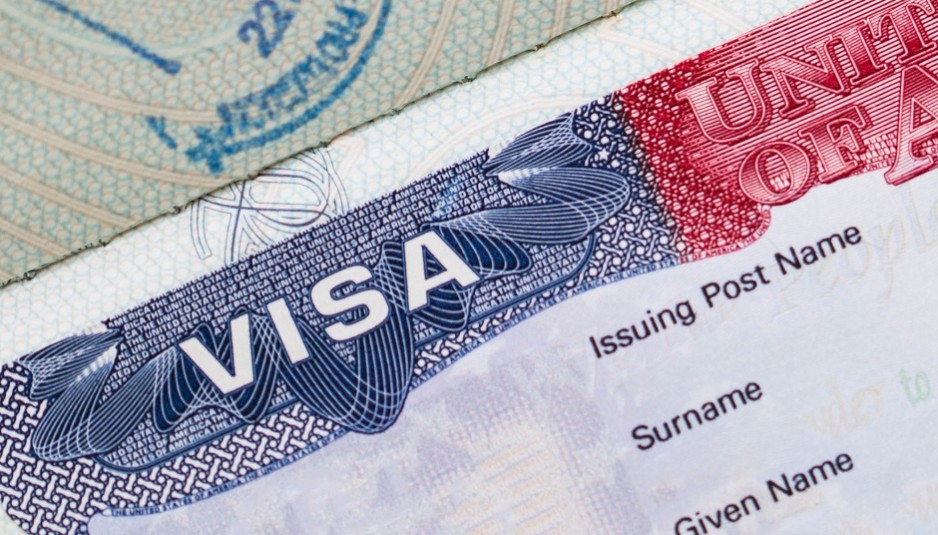
US ends legal status for 500,000 immigrants
The United States said Friday it was terminating the legal status of hundreds of thousands of immigrants, giving them weeks to leave the country.
President Donald Trump has pledged to carry out the largest deportation campaign in US history and curb immigration, mainly from Latin American nations.
The order affects around 532,000 Cubans, Haitians, Nicaraguans and Venezuelans who came to the United States under a scheme launched in October 2022 by Trump’s predecessor Joe Biden and expanded in January the following year.
They will lose their legal protection 30 days after the Department of Homeland Security’s order is published in the Federal Register, which is scheduled Tuesday.
That means immigrants sponsored by the program “must depart the United States” by April 24 unless they have secured another immigration status allowing them to remain in the country, the order says.
READ ALSO:
- Doctor removes 3-litre pus from farmer’s abdomen in Abia
- Osimhen breaks Odegbami’s Eagles goal record
- 2026 WCQ: Super Eagles move up to third place with 2-0 win in Rwanda
Welcome.US, which supports people seeking refuge in the United States, urged those affected by the move to “immediately” seek advice from an immigration lawyer.
The Processes for Cubans, Haitians, Nicaraguans, and Venezuelans (CHNV) program, announced in January 2023, allowed entry to the United States for two years for up to 30,000 migrants per month from the four countries, which have grim human rights records.
Biden touted the plan as a “safe and humane” way to ease pressure on the crowded US-Mexico border.
But the Department of Homeland Security stressed Friday that the scheme was “temporary.”
“Parole is inherently temporary, and parole alone is not an underlying basis for obtaining any immigration status, nor does it constitute an admission to the United States,” it said in the order.
Trump last week invoked rare wartime legislation to fly more than 200 alleged members of a Venezuelan gang to El Salvador, which has offered to imprison migrants and even US citizens at a discount.
US ends legal status for 500,000 immigrants
AFP
International
UK announces new passport application fees starting April 2025
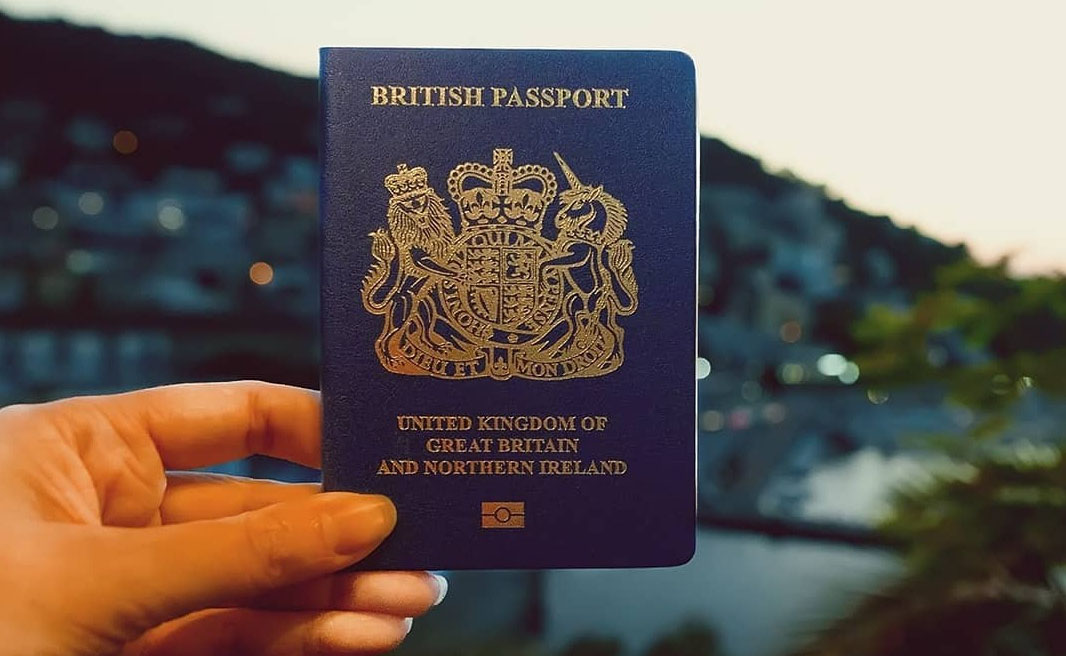
UK announces new passport application fees starting April 2025
The UK government has confirmed it will introduce new fees for passport applications beginning on April 10th, 2025.
The changes, which are still subject to parliamentary approval, will see a rise in costs for both online and paper applications, affecting adults and children alike.
According to the UK Home Office, the adjustments will apply to both domestic and overseas passport applications.
The fee increases, as stated, are part of an ongoing effort to ensure the passport system is financially self-sustaining, reducing the need for funding from general taxation. The Home Office clarified that the government does not make any profit from the fees.
Fee increases for domestic applications
Starting April 10th, 2025, the fee for a standard online application within the UK will rise for both adults and children. The cost for an adult’s application will increase from £88.50 to £94.50, while for children it will go up from £57.50 to £61.50.
Postal applications will also see an increase, with the adult fee rising from £100 to £107 and the child fee increasing from £69 to £74.
READ ALSO:
- Mohbad’s brother, Adura, arrested by police in Lagos
- UN staff member killed in central Gaza blast, five others injured
- Air Peace slashes Nigeria-London fare by N600,000
Charges to premium service fees
The Premium Service, which allows for passport issuance within one day, will also become more expensive.
- For adults, the fee will rise from £207.50 to £222
- For children, the fee will increase from £176.50 to £189.
This service is available for those who need a passport urgently and are applying from within the UK.
Higher costs for overseas applications
For individuals applying from overseas, the standard online application fee will also increase;
- The adult fee will rise from £101 to £108, and the child fee will increase from £65.50 to £70
- For paper applications made abroad, the adult fee will rise from £112.50 to £120.50, while the child fee will increase from £77 to £82.50.
The Home Office stated that the new fees are necessary to maintain the passport service and ensure it is financially viable. The fees contribute to covering the cost of processing passport applications, offering consular support to UK citizens overseas, and managing UK border services.
“The fees contribute to the cost of processing passport applications, consular support overseas, including for lost or stolen passports, and the cost of processing British citizens at UK borders,” the office said.
It is also related that in 2024, 99.7% of standard applications from the UK were processed within three weeks, where no additional information was required. Customers are advised to apply well in advance of their travel plans to avoid delays.
These fee adjustments are in line with guidelines from HM Treasury, which regularly reviews passport fees.
UK announces new passport application fees starting April 2025
-

 International3 days ago
International3 days agoUK announces new passport application fees starting April 2025
-

 metro1 day ago
metro1 day ago‘We’re not hiring,’ NNPC denies viral recruitment adverts
-

 metro18 hours ago
metro18 hours agoNatasha: Court blocks recall attempt, stops INEC
-
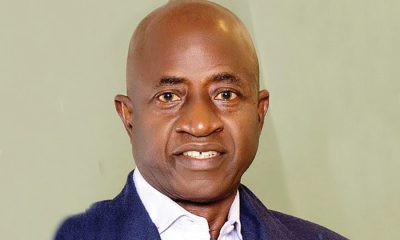
 Sports19 hours ago
Sports19 hours agoOdegbami speaks on Osimhen breaking his 44-year goals record
-

 metro2 days ago
metro2 days agoMore trouble brews in Rivers as Ijaw congress considers self-determination option
-

 metro3 days ago
metro3 days agoCourt lifts order stopping Senate probe on Natasha Akpoti
-
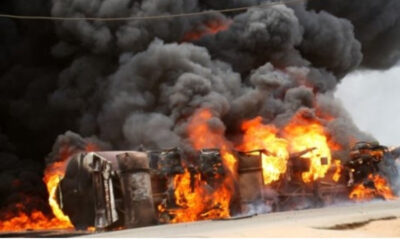
 metro3 days ago
metro3 days agoTanker explodes on Abuja bridge, many feared dead, 30 vehicles burnt
-

 metro3 days ago
metro3 days agoMohbad’s brother, Adura, arrested by police in Lagos

